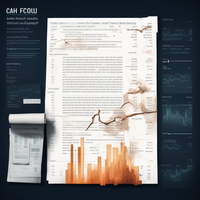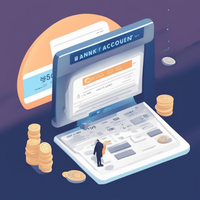Cryptocurrencies

Cryptocurrencies have revolutionized the financial landscape and are rapidly transforming the banking industry. As we delve into the future, several trends can be anticipated that will shape how cryptocurrencies are integrated into traditional banking systems. These trends include:
1. Increased Acceptance by Banks
One significant future trend is the increased acceptance of cryptocurrencies by banks. Currently, many banks view cryptocurrencies with skepticism due to their decentralized nature and perceived risks associated with security and regulatory compliance. However, as digital assets become more mainstream, banks are realizing the potential benefits they offer in terms of cost savings, efficiency, and enhanced customer experience.
2. Development of Central Bank Digital Currencies (CBDCs)
The rise of cryptocurrencies has also led many central banks to explore the concept of Central Bank Digital Currencies (CBDCs). CBDCs are digital representations of a country's fiat currency issued directly by its central bank. These digital currencies aim to provide better control over monetary policy while incorporating elements of blockchain technology.
3. Enhanced Security Measures
To tackle concerns surrounding security breaches and fraud associated with cryptocurrencies, future trends will focus on implementing enhanced security measures in banking systems dealing with digital assets. This may include advanced encryption techniques, multi-factor authentication, biometric identification methods, and robust cybersecurity protocols.
4. Integration of Blockchain Technology
Blockchain technology underpins most cryptocurrencies and offers various advantages such as transparency, decentralization, immutability, and efficiency for transaction processing. In the future, we can expect increased integration of blockchain technology within banking infrastructure to streamline processes like cross-border payments settlement and trade finance.
5. Collaborations with Fintech Startups
Banks recognizing the emerging importance of cryptocurrencies are expected to collaborate closely with fintech startups specializing in blockchain solutions or cryptocurrency platforms to gain expertise and innovation capabilities in this domain quickly. Such collaborations would drive technological advancements while allowing banks to tap into the growing customer base of crypto enthusiasts.
6. Regulatory Frameworks and Compliance
As cryptocurrencies gain wider acceptance, governments and regulators are expected to establish comprehensive regulatory frameworks to govern their use in the banking sector. These frameworks will aim to maintain financial stability, protect investors, prevent money laundering, and ensure compliance with existing laws and regulations.
7. Integration of Smart Contracts
Smart contracts, enabled by blockchain technology, automate contract execution based on predefined terms when specific conditions are met. In the future, we anticipate an increased utilization of smart contracts in banking systems to streamline processes such as loan applications, insurance claims settlements, and supply chain financing.
8. Adoption of Stablecoins
Stablecoins offer a solution for the price volatility associated with traditional cryptocurrencies like Bitcoin or Ethereum. These digital assets are typically pegged to stable assets like fiat currencies or commodities. Future trends suggest that banks may adopt stablecoins as a bridge between traditional finance systems and decentralized cryptocurrencies for smoother transaction settlement without significant price fluctuations.
In conclusion, the future trends in banking cryptocurrencies indicate increasing acceptance from banks, exploration of central bank digital currencies (CBDCs), enhanced security measures, greater integration of blockchain technology across various banking processes, collaborations with fintech startups specializing in cryptocurrency solutions, establishment of regulatory frameworks and compliance guidelines, utilization of smart contracts for automated execution, and adoption of stablecoins as more stable transactional mediums. By embracing these trends effectively while addressing potential challenges relating to security risks and regulatory compliance concerns, banks can unlock new opportunities offered by the digital asset revolution within the global financial landscape.
Sponsored
Sponsored
Sponsored
Explore More:

Market Risk
Risk management in banking is a critical aspect of the banking industry. Managing...

Credit Risk
Risk management in banking is a critical aspect of the banking industry. Managing...

Risk Management in Banking
Risk management in banking is a critical aspect of the banking industry. Managing...

Glass-Steagall Act
The Glass-Steagall Act, also known as the Banking Act of 1933, was an...

Dodd-Frank Act
The Dodd-Frank Act, officially known as the Dodd-Frank Wall Street Reform and Consumer...

Basel Accords
Banking regulations refer to the laws, rules, and guidelines imposed by regulatory authorities...

Banking Regulations
Banking regulations refer to the laws, rules, and guidelines imposed by regulatory authorities...

Cash Flow Statement
The cash flow statement is an important financial statement for banks as it...

Income Statement
The income statement is an essential component of a bank's financial statements. It...

Balance Sheet
The balance sheet is one of the most important financial statements used by...

Bank Financial Statements
Bank financial statements provide a comprehensive overview of a bank's financial performance and...

Online and Mobile Banking
In today's rapidly evolving technology landscape, the banking industry has undergone a significant...

Credit Cards
Credit cards are one of the most prominent banking products offered by financial...

Understanding Different Types of Bank Loans: Features and Benefits for Personal and Business Financing
Loans are a core offering of banking institutions, providing individuals and businesses with...

Checking Accounts
A checking account is one of the most common banking products used by...

Saving Accounts
Introduction In the world of banking, saving accounts are one of the most...